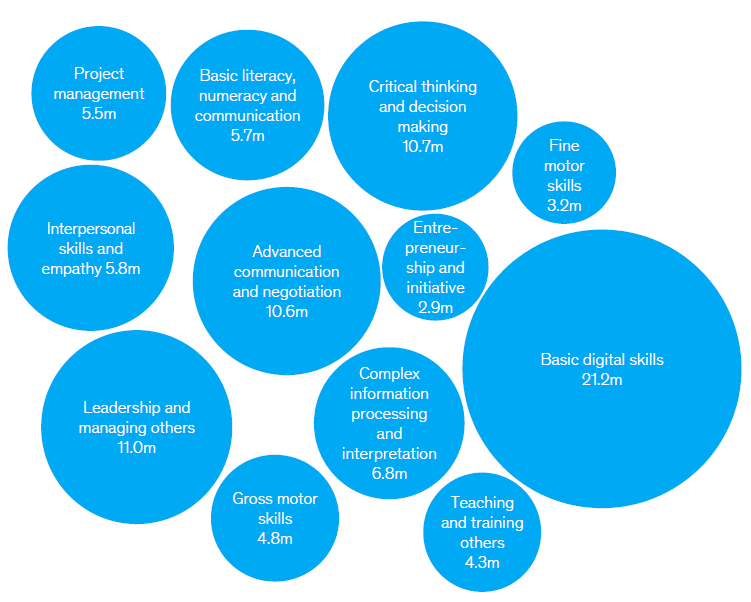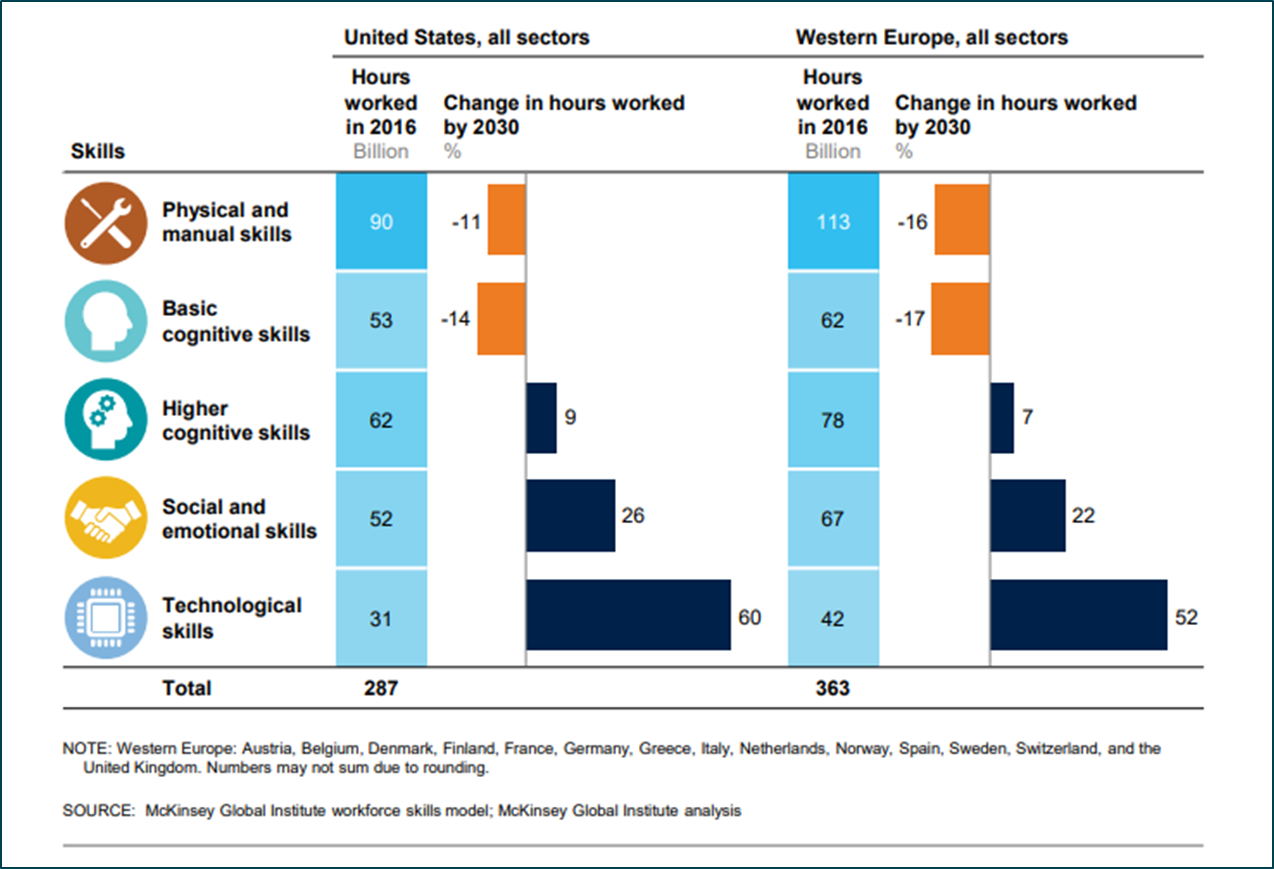Artificial intelligence, project management and the skills we'll need in 2030
I am going to start by asking that you read this article. It's a BBC article of Alibaba's Jack Ma and Tesla's Elon Musk taking opposing views of the risks and potential rewards of artificial intelligence (AI), at an event in Shanghai.
There are many reports about the potential impact of technology such as automation and AI on the future of jobs, so it is interesting to hear from two people who should have a good idea about all of this. Right?
So, did you read it? What did you think? Interesting? Funny? Alarming? Whose view do you subscribe to – Jack’s or Elon’s, or neither? Here are my highlights, and my commentary in square brackets:
Jack Ma
-
“I think people should work three days a week, four hours a day.” [I’m with you, Jack. I’m liking this view. A lot!]
-
“In the artificial intelligence period, people can live 120 years.” [Hmm... not sure I want to live to be 120.]
-
“At that time we are going to have a lot of jobs which nobody [will] want to do. So, we need artificial intelligence for the robots to take care of the old guys.” [I won’t need robots as I’m planning on my children taking care of me. Er…]
-
“So that's my view about jobs, don't worry about it, we will have jobs.” [And breathe!]
Elon Musk
-
“AI will make jobs kind of pointless.” [And panic!]
-
“Probably the last job that will remain will be writing AI, and then eventually, the AI will just write its own software.” [Er… is Elon predicting the end of human civilisation as we know it?]
-
“It's going to get to the point where [AI] just can completely simulate a person in every way possible, like, many people simultaneously.” [Okay. Let’s just go with this for now.]
-
“In fact, there's a strong argument, we're in the simulation right now" [Hmm…has Elon been watching The Matrix recently? Or Terminator?]
It’s funny, yet there is a serious undertone to it in that technology is impacting the future of work and we need to be ready for this. My view? I’m in neither Jack’s nor Elon’s camp – I’m in Tye Brady’s camp.
Tye Brady
Let’s bring it back a bit more to reality, and hear from Tye Brady – Amazon’s Chief Robotics Technologist – about what he thinks about robotics replacing humans. Please watch this short BBC video, and you can access it by using your device’s camera to scan the QR-code (below), or click this link to the BBC story.

Again, what did you think? I like Tye, and I summarise the interview below:
-
[Tye Brady] told the BBC the suggestion that robotics and AI would replace humans was a “myth”.
-
“The challenge that we have in front of us is how do we smartly design our machines to extend human capability.”
-
“The way that I think about this is a symphony of humans and machines working together…”
-
“…you need both.”
What a beautiful phrase: “a symphony of humans and machines working together” – wish I had come up with it. What’s clear is that technology is advancing (let’s acknowledge that we are in the midst of the 4IR – not on the brink of it) and so professions need to evolve to work with the technology: “You need both”. And project management needs to evolve.
How it needs to evolve is not an easy question to answer. And that’s the basis of the APM’s work: Projecting the Future. In my view, it is actually a set of interdependent questions. For example:
-
How do we attract, develop and retain future project professionals?
-
What skills does the project profession need in the future?
Anyone who knows me will acknowledge I like a stat! So, here’s a stat for you:
5.5m (projected) under-skilled workers in project management by 2030.
Let that sink in a moment. This statistic and the image below are taken from The future of work: Rethinking skills to tackle the UK’s looming talent shortage (McKinsey, Nov 2019) and shows the top 12 knowledge areas' projected number of underskilled workers by 2030. Did you spot project management? Top left: 5.5m projected under-skilled workers in project management by 2030.

By this account there is a resource shortage looming in project management. We need to fill it. Add in another stat (I told you!) from the World Economic Forum's The Future of Jobs Report 2016:
65% of children entering primary school today will ultimately end up working in completely new job types that don’t yet exist.
Are we facing a project management resource crisis?
And this is why I said how project management needs to evolve is a set of interdependent questions: to attract, develop and retain future project professionals is intrinsically linked to the skills the future of our profession needs. And the ‘mood’ is that soft skills (for want of a better word) are going to be more prominent in the future.
Sticking with the World Economic Forum, in 2016 they predicted the top 10 skills you need to thrive in the 4IR, which are below:

What I like about this is we can look back (it is 2020 after all) and see if the predictions came true. I certainly think all of the skills listed above are relevant (if not more so) to the 4IR right now. A couple of things I noticed about the two lists above: a lot of the skills have not changed (or were predicted not to change), and they are all soft skills.
I actually consider these skills to also be those that the project profession needs to evolve more – in my experience all too often these softer skills are underappreciated and underdeveloped compared to technical skills such as planning, risk management, financial management, etc. Clearly these technical skills are important, yet please don’t neglect the softer skills.
Let’s look ahead to 2030. Granted, that is a long horizon and a lot can (and will) change in the next decade, yet what skills are going to be needed?
According to some more research by McKinsey Global Institute: Skill shift: Automation and the future of the workforce, automation and AI will accelerate the shift in skills that the workforce needs – see the images below (reassuring to see project management in the skills predicted to increase):


How does all of this help solve the predicted project management resource shortage and how our profession needs to evolve?
No-one can predict the future so we don’t know what new and exciting technology will be with us in the next few years. However, what I am confident about is that whatever technology comes along, there will always be a need for soft skills as we will increasingly need to interact with technology: “You need both”.
And the lists above are not exhaustive. When I discuss these challenges with organisations, I always ask if there are any other skills that they think will be needed that are not mentioned, and I get replies of, for example: resilience; being able to deal with volatility, uncertainty, complexity and ambiguity (VUCA); innovation; servant-leadership; coaching; and entrepreneurship.
And this is where I think we have our answer. The skills needed for the future widens the resource pool for our profession. I get increasingly frustrated when I still see project management roles with too heavy a weighting on the technical skills. I contend to flip it, and put more weight on these softer skills. No longer do we need to attract or recruit from our own profession. Flip it, and look to a wider resource pool. What talent is there that possesses the increasingly important softer skills but perhaps not all of the technical skills?
The same Mckinsey report goes on to suggest some strategies for closing the looming skills gap – one of which is to "acquire talent from unconventional sources by focussing on the intrinsic qualities a person has rather than which sector those skills came from." I love this – by focussing more on the intrinsic soft skills of project management, can we plug the resource shortage this way? Are you bold enough to flip it?
Some of you reading this may not subscribe to what I’m advocating. For some of you, I may be pushing an open door. Whichever view you hold, we all have to be united in our responsibility to future-proof our profession. It is incumbent on all of us to do something about the resource shortage we are facing.

